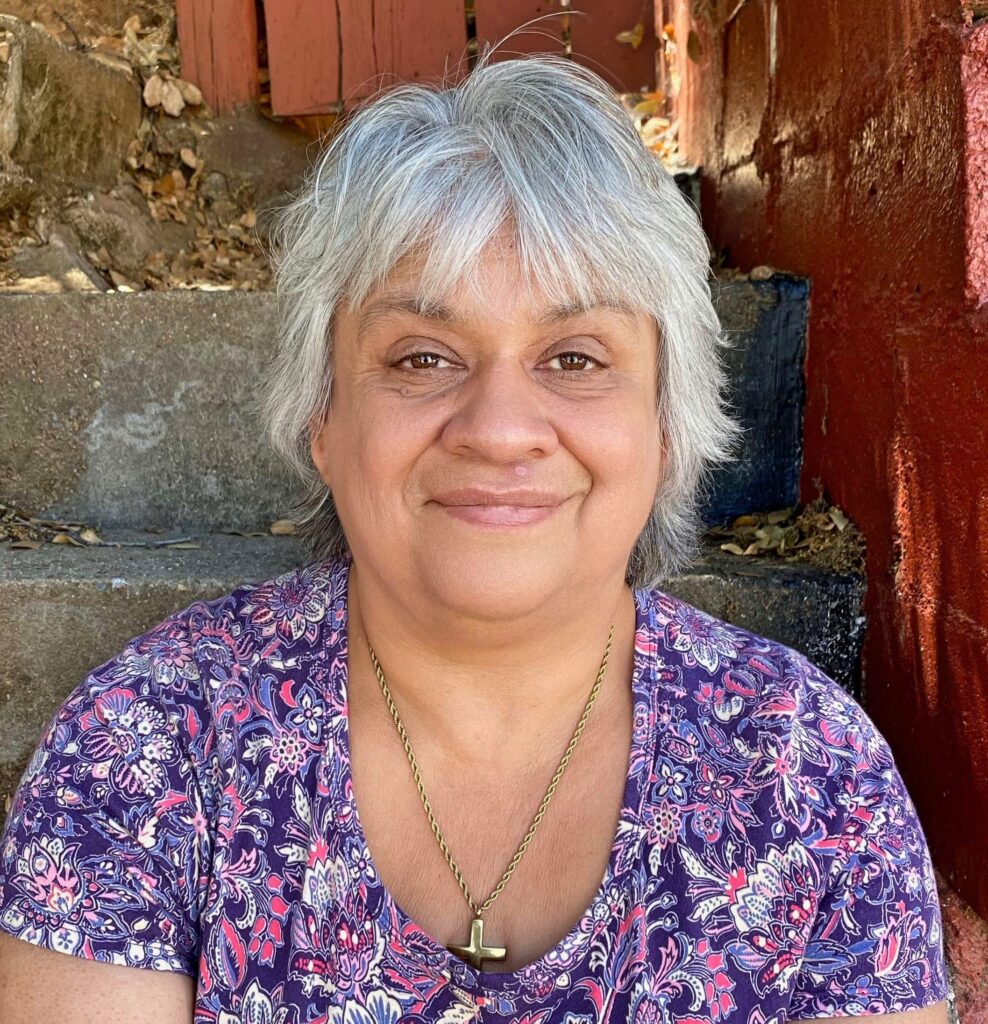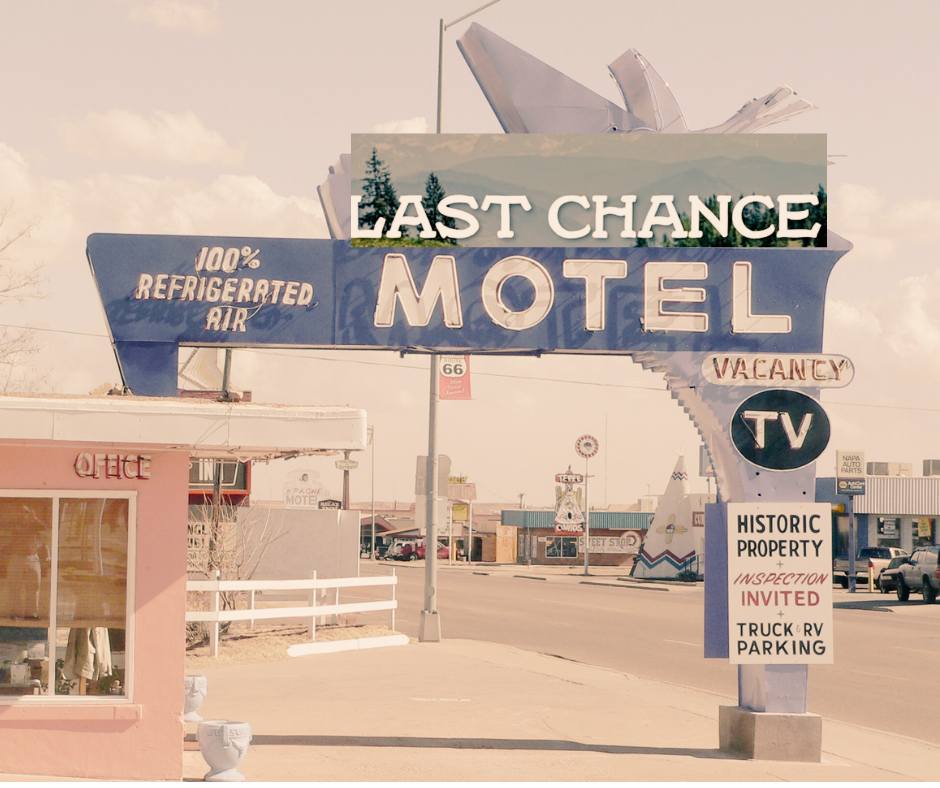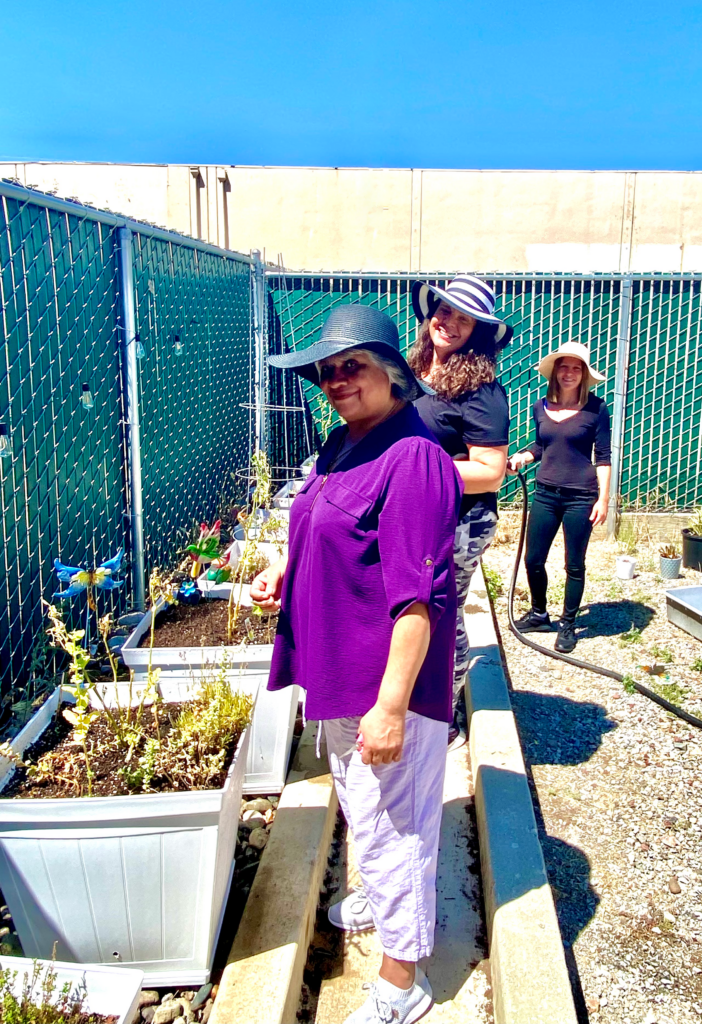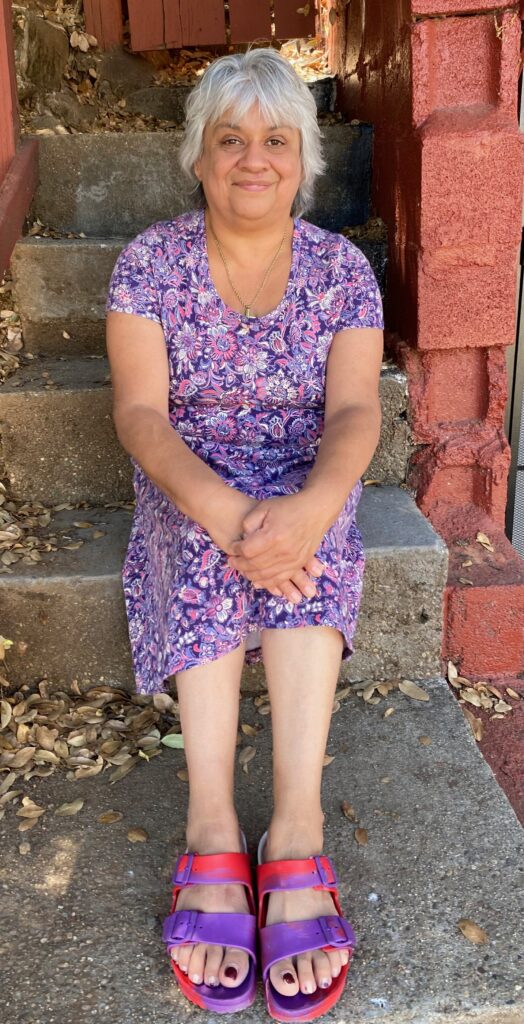Castaway: Marie’s Story
Her Mexican mother abandoned her at birth. Her American one was distant and cold. Not surprisingly, Marie grew up feeling emotionally shipwrecked…with no land in sight to call home.


Marie Vogt was raised in Juarez, Mexico…for all of three weeks. In January of 1967, just as she was reaching the cooing and lifting-her-head-up milestone, little Marie was whisked away from a Mexican orphanage and brought to Cottonwood, CA by an empty-nester couple. They had raised four children of their own and one half of the couple, at least, was eager to have a baby in the house again. The other parent’s emotional readiness was questionable.
Although she may have had good intentions, Marie’s new mother had some serious issues. While her father “doted upon her,” that was not the case with her mother. It was the era of “children should be seen and not heard” and she took that puritanical axiom seriously.
“My mother never told me she loved me, says Marie. “She never told me she was proud of me. She never uttered the words a child desperately needs to hear spoken: ‘I love you.’ And she would always say to me, ‘I am not your mother…your real mother didn’t want you.’”
When Marie became a teenager, she fell pregnant. Concerned about her family’s image, especially how it would look at church, her mother forced her into marriage. Seven years, and two children later, Marie’s life was a wreck. “For seven years, I endured verbal, physical, sexual and mental abuse,” said Marie. “My husband was an addict, so I started doing drugs in the naïve assumption it would bring us closer together.”
Marie’s life went from bad to worse when her husband started taking up with other women, then lying about it. When she confronted him, he would beat her. “I should have left him, but I loved him too much,” says Marie. The real issue, of course, was that Marie loved herself too little.
“I would never treat you that way.”
Eventually, Marie did leave the marriage. To find solace after the void left by her husband’s absence, she took up with her husband’s friend. In her mind, that friend was a totally different person. “He said the right things,” says Marie. ‘I would never treat you the way he did,’ he assured me. So, I fell in love with him. But it was all a lie…a big, fat lie. And for 22 years, I lived with the consequences of that decision.”
Just like her first husband, her second husband was both an abuser and an addict. He was also a womanizer and a ‘momma’s boy’. It was his financially well-off mother who helped to fund his addiction.; to her, the greater crime would be if her son abandoned her.
Marie felt trapped. But there were always reasons she couldn’t leave. At one point, when her husband had simultaneous hip surgeries, she became her husband’s full-time caregiver. As soon as he was on the mend, however, he was out chasing women again, albeit considerably slowed down by his hapless hips.
Feeling once again betrayed, Marie went from nurturing caregiver, to angry Cat Woman and her claws were ready and sharp. Her violent reaction took her husband completely by surprise. While her physical retaliation gave her a release for all her pent-up anger, she knew his shock wouldn’t last for long. He would continue to get stronger, and she would be no match for him. When he began verbally abusing Marie in front of her grandchildren, it was the last straw.

“My grandaughter started looking at me with such disrespect; it was painful,” says Marie. “And what was I teaching her? The last thing I wanted was for her to think doing drugs and knock-down, drag-out fighting was a normal way to live. So, I knew I had to leave. But each time I tried, he’d stop me. He’d do things like slash my tires and put stuff in my radiator so it would overheat. It was pure maliciousness.”
“Shoulda, woulda, coulda.”
Marie realized it was “do or die.” She secretly packed for three days and then moved to One Safe Place where she stayed for several months. They helped her get a restraining order, which her husband fought and won because, according to Marie, “Mommy had money.” Eventually, Marie moved into her own apartment, and landed a job at Mercy Hospital. It seemed she was finally on her way to normalcy. But even a town called “Normal” has entry requirements—requirements she just couldn’t fulfill. She knew that to be true the day her husband showed up and schemed his way back into her life.
“One day I saw him, and he acted so nice,” said Marie. “And because I was still in love with him, I conveniently forgot all the bad stuff. For good or for bad, after 27 years of marriage, he had become a part of me. So, when he started coming around saying all these nice things, including that he wanted to make up for all the years he was abusive, I believed him.”

“Shoulda, woulda, coulda.” While Marie should have predicted the ending to that script, her codependency took center stage. She allowed her husband back into her life and the cycle began all over again. She found herself looking forward to him coming over, and when he wouldn’t show up, she’d do an emotional deep dive. “I’d get so depressed and sad, and I started drinking again,” said Marie. Only this time, she didn’t just drink, or smoke weed. She also started doing meth. Eventually, she got caught doing drugs at her job and was let go. Things just spiraled downward from there.
“I lost everything,” said Marie. “I lost my job, I lost my car, I lost my apartment, I lost my husband and I lost myself. Really, losing him was the same as losing myself because apart from him, I had no identity.”
It would take an unexpected change of address for Marie to finally wake up and face the truth—about herself. That address? The Good News Rescue Mission.
Best Birthday Present Ever
Marie was not unfamiliar with the Mission. Both her children’s father and her sister-in-law had spent time there on and off, either because of either homelessness or addiction—or both. In a million years, she never thought she’d be joining their ranks. Even the thought of going there filled her with dread. She was sure she would be robbed or beaten…or worse. Or maybe she would turn into one of “them.” After all, she wasn’t an addict. She just had a “little problem.”
Sure, she wasn’t exactly a fully functional human being, but there was no way she was a full-blown addict, she thought to herself. Yes, she had lost everything—including all her relationships. But she had never been in jail or gone to rehab. Only real losers went that route, she reasoned.
Denial, of course, is intrinsic to addiction. “I am not like those men” type of distancing language gives the addict permission to remain in their addiction. Thinking any other way means having to admit you are, in fact, exactly like “those men.” It was no different with Marie. The thought of going to the Mission terrified her. And it wasn’t just because she was worried about her personal safety or her belongings. It went deeper than that—much deeper. But end up at the Mission she did.
About two months into her stay at the Mission, she began to come to terms with her dead-end life.
“I got tired of wearing the same clothes and of feeling sad and depressed,” says Marie. “But I knew it would just continue that way if I didn’t do something different. So, there I was, two days before my 56th birthday and I decided to give myself the best present a person could give themselves: I threw away my drugs—all of them.”
Last Chance Motel
The next present Marie gave herself was partly because of a lack of a better alternative. She had just tossed out her drugs and due to extenuating circumstances, she was faced with the prospect of trying to survive out on the street. Imagining what her life would look like when that scenario materialized, she chose instead to enter the Mission’s Recovery Program. While fearing the worst isn’t usually the purest of motives for choosing recovery, God can work with that. Be it a bad choice, or even a good choice made with the wrong motive, any choice can become a redemptive one when God is in “hot pursuit” of our hearts.

Sometimes, all we know is we’ve somehow managed to get one foot unstuck from the muck and the mire. That’s it. But it’s forward motion that counts—even if it means checking into the Last Chance Motel where, rumor has it, there’s a super caring guy with a beard and sandals who runs the place. “The owner goes above and beyond to make you feel like the most valued guest on earth,” writes one reviewer. “He’ll even make you a free fish breakfast…then save your life if you’re in trouble!” reads another review by a regular named Peter.
And so, on the day of her 56th birthday, Marie heeded that “still small voice” and reached out to the Victory House, the Mission’s recovery program for women, to schedule an interview. “I told myself it I was accepted into the program, it would be my first sign from God that I was on the right path,” says Marie.
Marie was accepted that same day. She walked back to the Mission’s House of Hope, grabbed her belongings and moved into the Victory House. That was January 17, 2023. She’s now nine months into recovery and doing well. She’s honest and transparent about her past failings and is acutely aware that at her age, this may well be her final opportunity to turn her life around—to become the woman God designed her to be. It’s been rough, as resisting those urges to cope in old, unhealthy ways always is. It’s also been incredibly humbling.
Under New Management
It took a while, but Marie now has a very different view of the women who have joined the program after her—a perspective that began the moment she realized she was no better than anyone else—either at Victory House or at the Mission shelter.
“Chronologically, I’m the oldest person here, so that makes me kind of a veteran,” laughs Marie. “And I’m probably ‘old’ in other ways, as well. At least that’s what my aching back told me yesterday! Seriously, like all the girls, I was broken when I came here. Then Jesus started binding up my wounds and loving on me. So, how can I judge anyone, anymore? And I may look at one of them sometimes and say to myself, ‘Okay, that was a strange choice. I don’t know why they did that.’ But now, instead of judging them, I just smile and talk with them. Because we’re all in the same lifeboat.”


Marie’s encounter with the Lord, one that changed everything, began just before Easter while attending Pathways church. Sitting in the pew, she heard Jesus call her name, inviting her into a relationship with Him. She answered the call and upon giving Him her “Yes,” she felt God’s love flood her heart. In a single moment, Marie went from orphan to “fully accepted.”
“Before entering the program. I knew of God, but I didn’t believe in God,” says Marie. “But I do now. And I feel so different! At long last, I know that I am somebody with worth, and that I belong somewhere. And it’s crazy how I had to join a group of strangers to discover the family I had always longed for, but which up to now, had felt so elusive. And how do you explain this to somebody—that suddenly I had this love in my heart that I wanted to share with everybody?”
That’s a far cry from the broken, filled-with-self-hatred orphan from south of the border who never once in her 56 years, felt she really belonged anywhere. The little girl who was abandoned at birth, adopted by a mother who showed her little tenderness or affection, then later married two manipulative and abusive men, seemed to have no other choice but to cope by chemically numbing herself. Of course, in the strictest sense of the word, she had a choice. But all too often the pain of abandonment is so powerful, so all-consuming, that when offered an “easy” way to get relief, you seize it. Marie describes that suffocating pain she used to feel:
“I would continually ask God, the God who I didn’t really know, why He put me through all that stuff? says Marie. “Why did He make me the way I was? Because I did not like who I was, I didn’t like what I was doing. I didn’t like where I was. I didn’t like me.”
It’s painful just to hear those words. But if we feel pain hearing that, consider it a good thing. Because unless we walk step by step in someone else’s shoes, we can never know how paralyzing that pain can be. And it’s why God calls us not to stand on the outside looking in as an indifferent observer, or a self-righteous Pharisee, but rather to walk alongside those who lag behind.
“And no one was weak, or feeble, in all their tribes.” (Psalm 105:37). That’s God’s desire: that no one is left behind. “We who are strong in faith should help the weak with their weaknesses, and not please only ourselves. Let each of us please our neighbors for their good, to help them be stronger in faith” (Rom. 15:1-2).
“Please, take that chance”
Marie doesn’t want anyone to be left behind. Or to feel like an orphan, as she once did. She recalls a Mission guest she recently reached out to:
“I talked to this young man I had met about joining the men’s program. I felt strongly compelled to tell him he needed to do that. And I told him, ‘You need to get help. God loves you and you could get help there.’ And I didn’t preach. I just shared my own story, then said, “You’re a good-looking kid. You’ve got your whole life ahead of you and all you need is someone who will listen and help you. So, please, take that chance.”
“Please, take that chance.” Polite, but insistent. That’s Marie’s way. And it’s what that young man needed—someone who cared enough not to mind their own business, but rather be about the Father’s business, which is to bring the prodigals home…no matter what their status is in life, or how far down the rabbit hole they’ve gone. And there was, perhaps, no better person to do that than Marie, the woman who just 10 months ago had heard that same polite, but insistent, “still, small voice” make that same plea to her. And she’s so very glad she listened.




